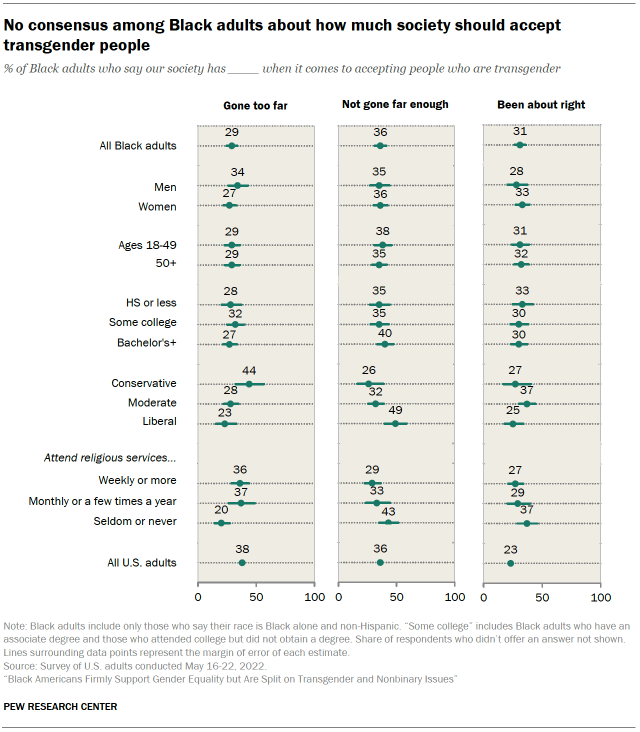The intersection of race with gender identity and sexuality presents a unique set of challenges for Black Americans. Although most Black adults say they experience discrimination because of their race (79%), many scholars and activists say the nature of discrimination changes when people have multiple identities. This compounded nature of inequality was termed “intersectionality” in 1989 by legal scholar Kimberlé Crenshaw.
Intersectionality was originally put forward to examine blind spots in discrimination law that caused Black women’s claims of unequal treatment to be routinely misinterpreted by courts. Black women were left to either bring suits based on race, in which their experiences were compared with Black men’s, or to bring suits as women and have their claims be compared to those of White women. They often lost both types of cases. If they tried to claim they were discriminated against specifically as “Black women,” they were accused of opening a “Pandora’s box” by seeking to create a new legally protected class.
Beyond its legal beginnings, the more popular usage of intersectionality focuses on how different mixtures of identities produce different, and often worse, experiences of inequality. For example, while about one-in-three LGBTQ Americans report that they have experienced discrimination in the year prior to being surveyed, LGBTQ people of color are more likely to report discrimination of any kind than White LGBTQ people, a 2020 Center for American Progress-NORC survey found. These intersectional differences are particularly dire when it comes to transgender and nonbinary people specifically. Since 2013, over 300 transgender and nonbinary people have been victims of fatal violence, according to the Human Rights Campaign Foundation. Two-thirds (63%) of those victims have been Black transgender women.
This chapter draws on data from two Pew Research Center surveys. The first was of U.S. adults with a large oversample of Black adults and was conducted in October 2021. The second was of U.S. adults and conducted in May 2022.6
Black Americans prioritize race but still think other inequalities should be addressed
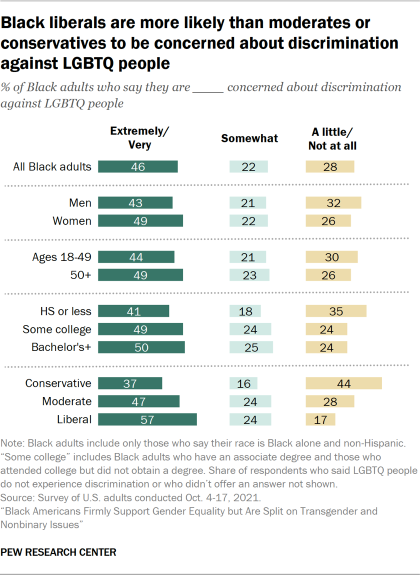
About six-in-ten Black adults (62%) say Black people should prioritize the struggle against racism over other inequalities, according to a 2021 survey of U.S. adults. At the same time, three-in-ten Black adults (30%) say the opposite: that racism should not be prioritized over other inequalities.
Among those who say racism should not be prioritized, most say this is because racism is equally as important as other inequalities (43%) or that racism is interconnected with other inequalities (36%).
Although many Black Americans view the fight against racism as their primary struggle for progress, they also view discrimination against LGBTQ people as problematic.
Nearly half of Black adults say they are extremely or very concerned about discrimination against LGBTQ people (46%). About one-in-five Black adults say they are somewhat concerned about it (22%), and 28% of Black adults say they are a little or not at all concerned.
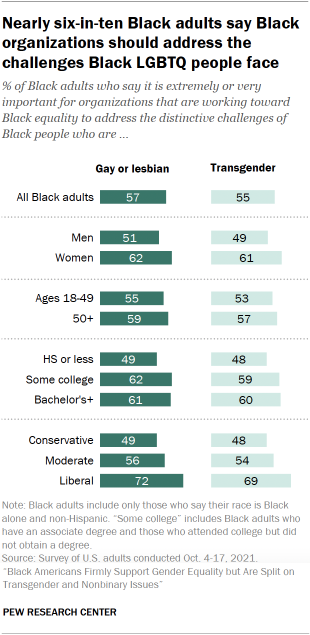
When it comes to education, half of Black adults with a bachelor’s degree (50%) and some college experience but no bachelor’s degree (49%) say they are extremely or very concerned about discrimination against LGBTQ people, compared with 41% of those with a high school diploma or less.
The shares of Black liberals (57%) and moderates (47%) who are extremely or very concerned outpace the share of Black conservatives who say this (37%).
When it comes to social action on intersectional issues, nearly six-in-ten Black adults say it is extremely or very important for organizations that are working toward Black equality to address the distinctive challenges of Black people who are gay or lesbian (57%) or transgender (55%).
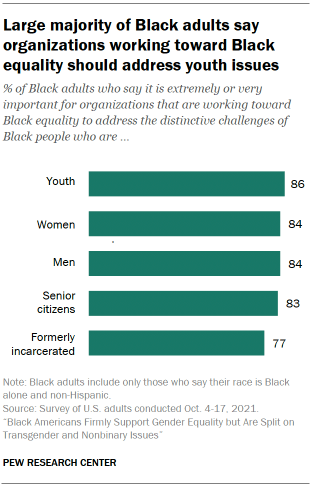
Survey respondents were asked the same question about how important it is for organizations working toward Black equality to address the distinct challenges of other groups of Black people. For these other groups, larger shares say the organizations should address the distinctive challenges of Black youth (86%), Black men and women (84% respectively), Black senior citizens (83%) and formerly incarcerated Black people (77%).
When it comes to their views on organizations working toward equality for Black gay, lesbian or transgender people, Black adults differ by gender, education and political ideology. Black women are more likely than Black men to say it is extremely or very important for organizations that work toward Black equality to address the distinctive challenges of Black people who are gay or lesbian (62% vs. 51%). There is a similar split between Black women (61%) and Black men (49%) when it comes to addressing the issues that Black transgender people face.
About six-in-ten Black adults with a bachelor’s degree (61%) and those with college experience but no bachelor’s degree (62%) say organizations working toward Black equality should address the unique issues of Black people who are gay or lesbian. A smaller share of Black adults with a high school diploma or less say the same (49%). This pattern repeats when it comes to the issues that Black transgender people face.
Black liberals are more likely than their moderate and conservative peers to say that organizations working toward Black equality should address the distinctive challenges faced by Black gay and lesbian (72%) or transgender (69%) people.
CORRECTION (Feb. 27, 2023): The chart “Nearly six-in-ten Black adults say Black organizations should address the challenges Black LGBTQ people face,” the rows for women and men have been edited to correct an inversion in the percentages of Black women and Black men who think organizations should address challenges that Black gay and lesbian people face. These figures are 62% and 51%, respectively. These numbers were referenced correctly in the body of the report, and the changes did not affect the report’s substantive findings.
Personal connections to people who are transgender and nonbinary
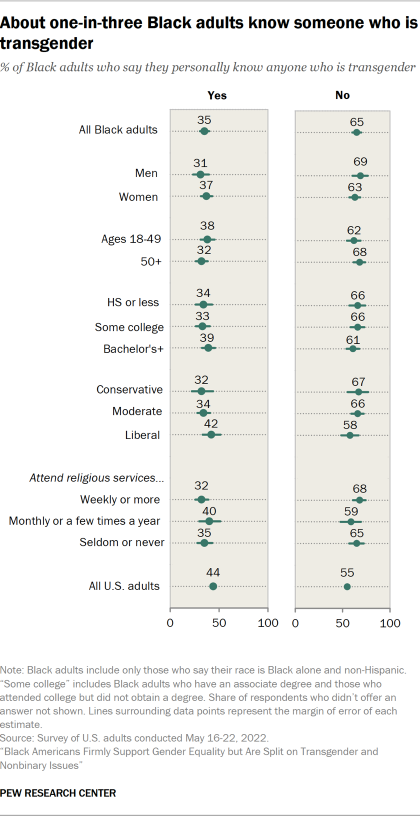
About 1.4% of Black adults are transgender or nonbinary – that is, their gender is something other than the sex they were assigned at birth.
Although few are transgender themselves, 35% of Black adults know someone who is transgender. This is smaller than the share of the general public who say they know a transgender person (44%).
Among Black adults who know someone who is transgender, that person is more likely to be a friend (63%) than a relative (31%) or co-worker (29%).
The majority of Black adults (64%) say they have heard about people who are nonbinary – that is, those who do not identify as a man or woman. This includes 19% who have heard a lot and 45% who have heard a little.
About a third of Black adults (36%) say they have heard nothing at all about nonbinary people. Among Black adults who have heard at least a little, 26% say they know someone personally who is nonbinary.
Most Black adults say gender is determined by the sex assigned at birth
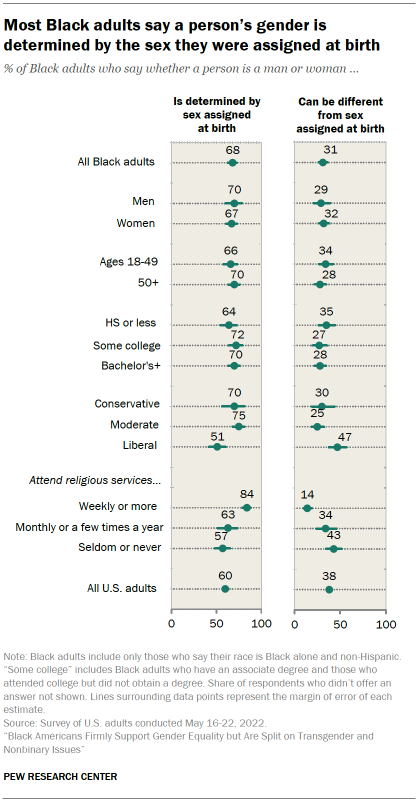
About two-thirds of Black adults (68%) say that whether a person is a man or a woman is determined by the sex they were assigned at birth. A smaller share say the opposite: that someone can be a man or woman even if this differs from the sex they were assigned at birth (31%).
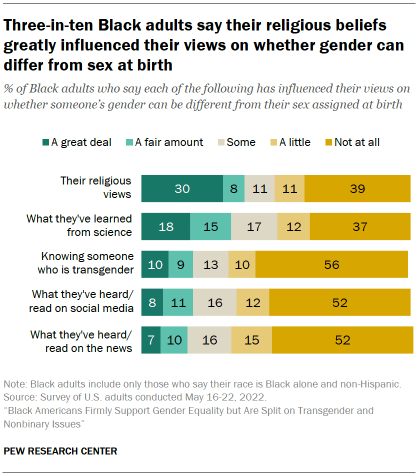
Black adults (68%) are slightly more likely than the general public (60%) to say that gender is determined by sex at birth.
About two-thirds or more of Black men and women, as well as of those of various ages and educational levels, say that gender is based on sex assignment at birth. However, there are differences by political ideology and religious service attendance.
Black moderates (75%) are more likely than liberals (51%) to say that whether a person is a man or woman is determined by their sex assigned at birth.
And about eight-in-ten Black adults who attend religious services at least once a week (84%) say gender is based on sex assignment at birth. This is higher than the shares among those who attend monthly or a few times a year (63%) or who seldom or never attend (57%).
Black adults’ views on whether someone’s gender can differ from the sex they were assigned at birth are influenced by different sources. Some 37% of Black adults say their views are influenced a great deal or fair amount by their religious beliefs, while 33% say their views are influenced by what they learned from science.
About one-in-five say their views on sex assignment at birth are influenced by knowing someone who is transgender (20%), what they have heard or read on social media (19%) or what they have heard or read on the news (17%). Black adults differ in the influences they cite by religious service attendance and political ideology.
Black adults who attend religious services weekly (54%) are more likely than those who rarely or never attend (22%) to say their religious beliefs influenced their views on sex assignment at birth a great deal or a fair amount.
About a third of Black liberals (32%) say their views on whether gender is determined by sex assignment at birth are influenced a great deal or fair amount by knowing someone who is transgender. Smaller shares of Black moderates (15%) and conservatives (13%) say the same.
Black adults are split on how accepting society should be of transgender people
Six-in-ten Black adults (60%) say there is a great deal or fair amount of discrimination against transgender people in the U.S. today, according to a 2022 Pew Research Center survey of U.S. adults.7 And 40% say society is a little or not at all accepting of transgender people.
Despite these views, there is no consensus among Black adults about how accepting society should be of transgender people. Roughly a third of Black adults say society has not gone far enough when it comes to accepting people who are transgender (36%), 31% say acceptance of transgender people has been about right and 29% say it has gone too far. Black adults differ on this question by political ideology and religious service attendance.
About half of Black liberals (49%) say society has not gone far enough in accepting transgender people, while smaller shares of moderates (32%) and conservatives (26%) say the same. Meanwhile, Black adults who attend religious services monthly (37%) or weekly (36%) are more likely than those who seldom or never attend (20%) to say society has gone too far in accepting transgender people.
There is also no clear consensus among Black adults on how quickly views on transgender and nonbinary issues in society are changing. Some 41% say views are changing at the right speed, 34% say views are changing too quickly and about one-in-five Black adults (22%) say they are not changing quickly enough.
Like many of the views stated above, Black adults differ on the speed of change by religious service attendance and political ideology. Those who attend religious services weekly (44%) are more likely than those who rarely or never attend (27%) to say views on transgender and nonbinary issues in society are changing too quickly. And about one-third of Black liberals (33%) say views are not changing quickly enough, compared with 18% of moderates and 14% of conservatives.
While there are no clear majority opinions on these issues among Black adults, they are less likely than the general public to say our society has gone too far in accepting people who are transgender (29% vs. 38%).
